The 9 Unhealthiest Juices On Grocery Store Shelves
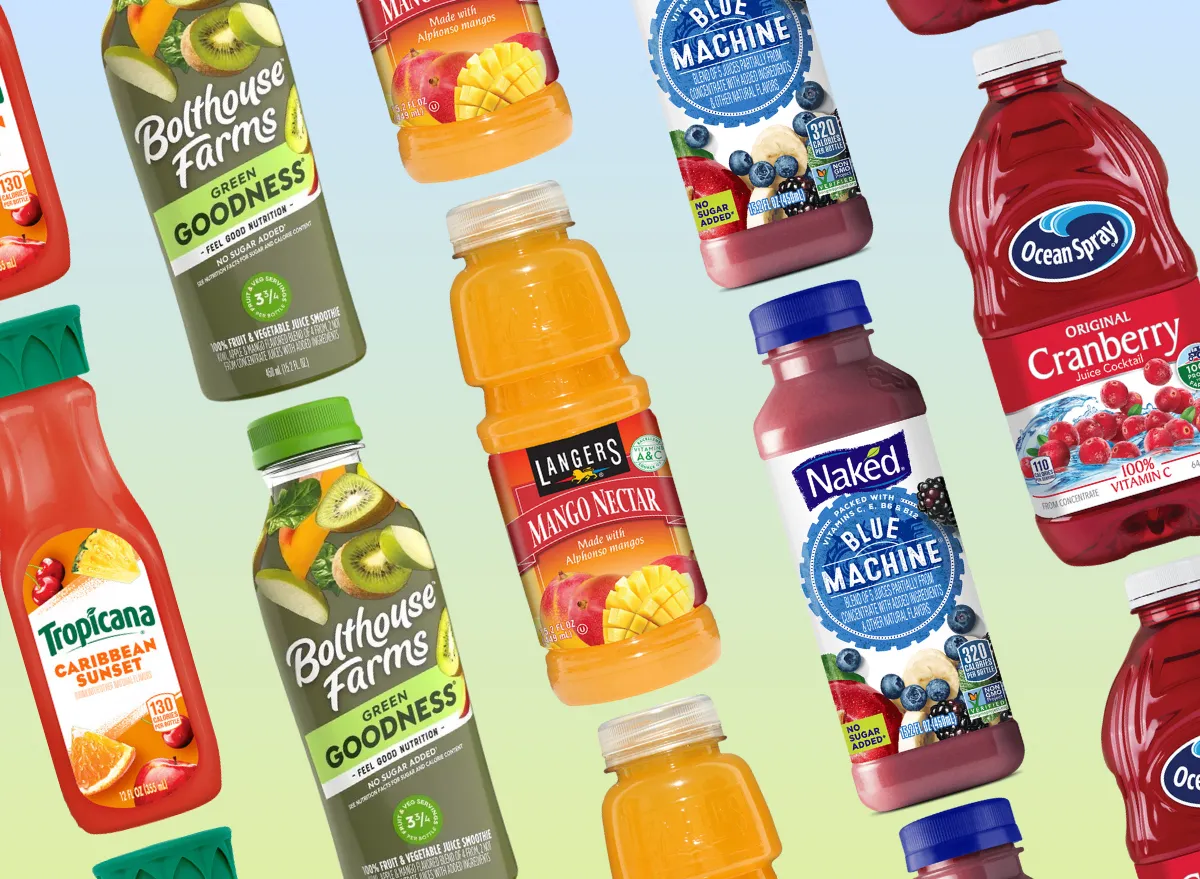
In theory, juice should be a healthy beverage—it’s made from fruit, after all, right? Even the dietary guidelines consider a cup of 100% fruit juice to be a single serving of fruit. Unfortunately, though, not all juice brands are created equal, and some may be more detrimental to our health than we realize.
That’s because many of the bottled juices stocking the shelves at your local supermarket contain very little actual fruit, almost no fiber, and a whole lot of added sugar.
To shed light on the less-than-ideal choices, we spoke with dietitian experts to compile a list of the juice brands that fall short with respect to nutrition and overall health.
From sugar-laden blends to misleading health claims, prepare to discover which juice brands to skip if you’re working toward a healthier lifestyle. Also, for more tips to help you discern which foods are actually healthy versus the imposters, be sure to check out 7 ‘Healthy’ Foods That Are Actually Worse for You Than Candy, Say Dietitians.
How healthy is fruit juice, really?
Your inkling that fruit juice is healthy is true! Fruit juices—100% fruit juices, specifically—can be a good source of essential vitamins and minerals, such as vitamin C and potassium, and they provide some antioxidants. Additionally, juice can be a convenient way to consume fruit, especially if fresh fruit is not available or you find yourself struggling to consume fruit at each meal.
The biggest downside to fruit juice is that it’s high in sugar, and if you’re not drinking 100% juice, your beverage is probably also high in added sugars. Studies show that sugar-sweetened beverages, such as certain unhealthy juice drinks, are the single largest source of calories and added sugar in the U.S. diet. These drinks don’t really fill you up, nor do they provide much nutritional value.
It’s important to consume fruit juice in moderation and limit your portion sizes, which is considered to be one cup or eight ounces. The USDA suggests that “at least half of the recommended amount of fruit eaten should come from whole fruit, rather than 100% fruit juice” because whole fruit provides beneficial nutrients, such as fiber, that’s missing in the juiced version.
What makes a store-bought juice unhealthy
Experts say these factors can help you identify juice brands that are less nutritionally beneficial.
- The label doesn’t say “100% fruit juice”: This label claim means that the juice has no additional sugar added during processing. In a healthy juice, the fruit juice itself should be the primary ingredient, and if added sugar is listed within the first three ingredients, it likely contains a significant amount.
- High amounts of sugar—both added and natural: As a general rule, the more added sugar a juice contains, the worse it is for you. But you’ll want to limit the total amount of sugar in the juice as well—even if it comes from the fruit. While you may know to limit, if not avoid, consuming added sugars, you should still limit your total sugar intake to 12 grams of sugar or less for blood sugar control.
- Low to no vitamin content: Juice should always contain vitamins—if they don’t, they’re likely made with very little real fruit, says Jesse Feder, MS, RDN, a personal trainer and registered dietitian with the My Crohn’s and Colitis Team. To maximize the nutritional value of your juice, look for options that are fortified with nutrients like added fiber to support digestive health.
Now that you know how to best identify fruit juice that is actually good for you, find out which juice brands are masquerading as healthy, nutritionally dense options that you’ll want to steer clear of, per the advice of dietitians. Here’s what nutritionists say are the unhealthiest juice brands in stores. Read on, and for more, don’t miss 8 Soda Brands To Stay Away From Right Now.
Bolthouse Farms’ Green Goodess
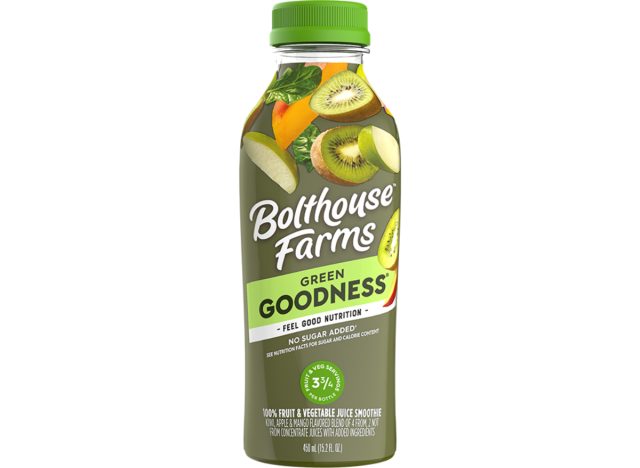
“While Bolthouse Farms’ Green Goodess may seem like a nutritious choice with its blend of spinach, kale, and spirulina, a closer look at its nutritional profile reveals a significant problem,” explains Jessie Hulsey, RD, an Atlanta-based dietitian.”With a staggering 46 grams of total sugar, only 3 grams of fiber, and a mere 2 grams of protein per serving, this smoothie falls short of providing the balanced nutrition that individuals need. Excessive sugar intake, coupled with insufficient fiber and protein, can lead to blood sugar spikes, poor digestion, and a lack of satiety.”
Ocean Spray Cranberry Juice Cocktail
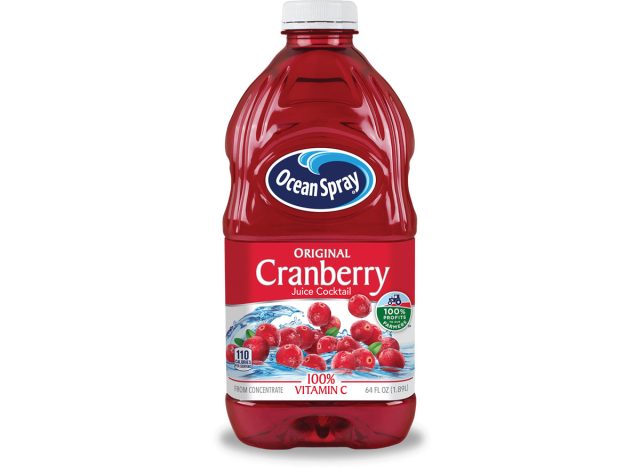
Sarah Pflugradt, MS, RDN, CSCS, of Fueling Active Kids advises against Cranberry Juice Cocktails. “Cranberry juice cocktail sounds like a sip of healthy antioxidants, but go for the 100% juice if cranberry is your juice of choice. The ‘cocktail’ typically means it is loaded with added sugar,” says Pflugradt.
For children under the age of two, juice is no longer recommended due to its high sugar and calorie content without many other nutrients. Ocean Spray’s Cranberry Juice Cocktail is one example of how much added sugar can be packed into cranberry juice. With 25 grams of sugar in 8 ounces, you’ll meet the daily added sugar recommendation in just one serving!
Welch’s Fruit Punch
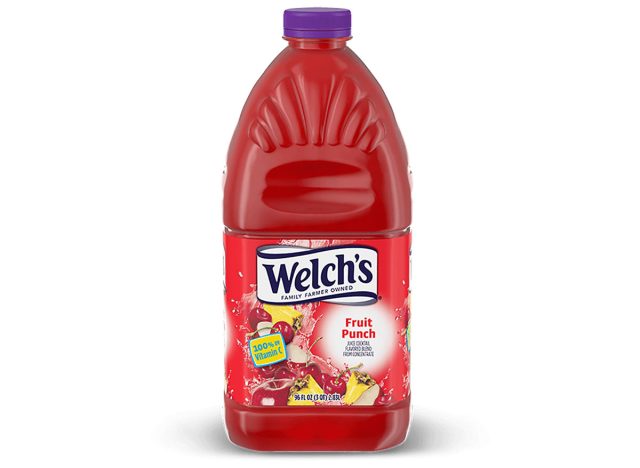
An 8-ounce serving of this juice contains about 50% of your daily value for vitamin C. Aside from that, though, this beverage offers almost no nutritional benefits—and a number of drawbacks.
“The first two ingredients in Welch’s Fruit Punch are water and high fructose corn syrup,” says Feder. “It’s high in added sugars [22 out of the 23 total grams of sugar are added sugars], which can lead to unwanted weight gain and chronic diseases when consistently consumed. Additionally, it lacks several important vitamins and minerals and has no significant nutritional value.”
This product also contains the zero-calorie sweetener sucralose, which some studies have found may cause an imbalance in the gut microbiome, as well as reduce insulin sensitivity.
PUR Cold Pressed Turmeric Lemonade
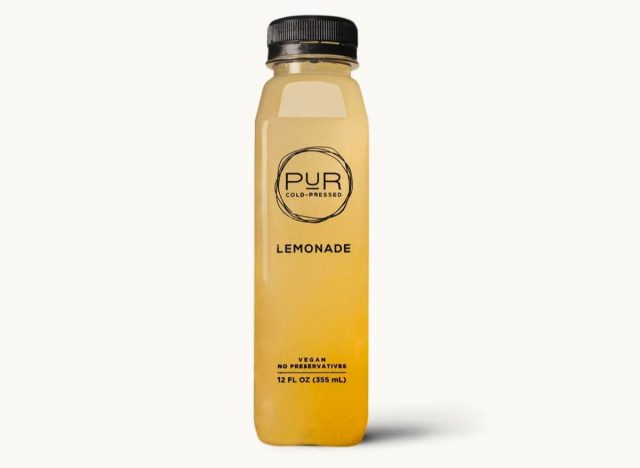
“The PUR Cold Pressed Turmeric Lemonade juice may sound like a healthy choice containing anti-inflammatory turmeric, but with 30 grams of added sugar in a 16-ounce serving, that is far from something that will reduce inflammation. Consuming too much added sugar can raise blood pressure, blood sugar, and triglycerides (a common fat in the blood), which are all markers of inflammation,” says Sheri Berger, RDN, CDCES.
PUR carries a line of shot-sized juices that might be a better way to get your fix. Packed with antioxidants and other micronutrients, you can get your nutrition in a condensed serving size without the added sugars.
Naked Blue Machine Juice
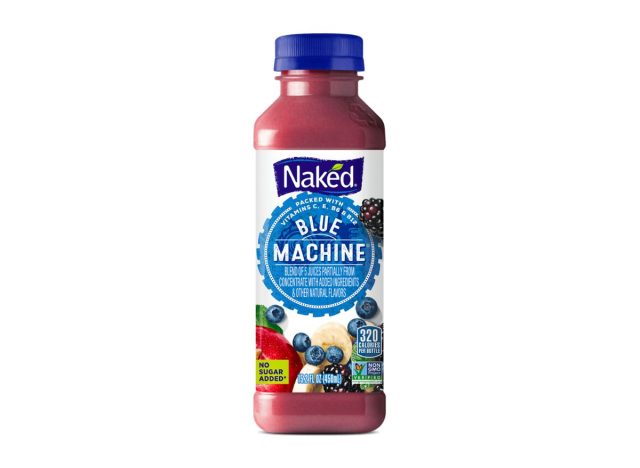
When it comes to the unhealthiest fruit juices, Patricia Kolesa, MS, RDN, tells us that “the first juice that comes to mind for me is Naked Juice.”
“While many of them contain fruits and vegetables, some of them [such as the Blue Machine flavor] contain 50 grams of sugar or more,” says Kolesa. “This is more than you might get from a can of soda! Too much added sugar from beverages in the diet can contribute to blood sugar spikes and ‘sugar crashes’ or low energy levels.”
For a healthier alternative, Kolesa advises the following: “My recommendations would be to make your own juice—or smoothie—at home or eat whole fruits as often as possible!”
Langers Mango Nectar
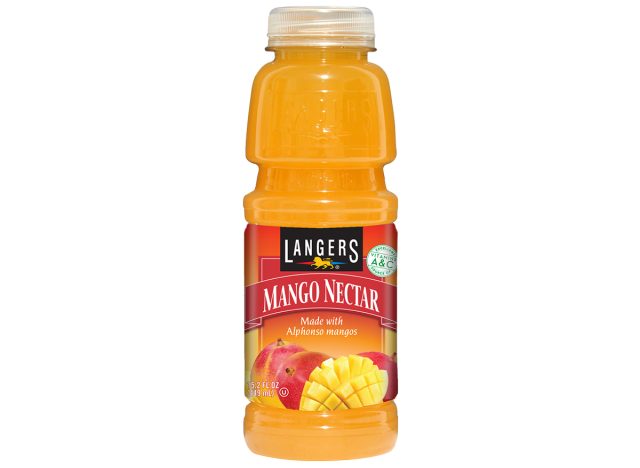
In addition to avoiding the health halo claims noted above, you’ll also want to take a second look at any juice labeled as “GMO-free” or claiming to have “no high fructose corn syrup,” as these claims can also create a false sense of healthiness for certain juice products. Oftentimes, juice “cocktails” can still be pumped with added sugars.
This appears to be the case with Langers Mango Nectar Juice, which despite its claim not to contain any high fructose corn syrup, still contains 23 grams of added sugars per cup. That’s a whopping 46% of your recommended daily limit for sugar for a tiny drink! Langers’ ingredients are also primarily composed of filtered water and has minimal amounts of mango puree.
Tropicana Caribbean Sunset
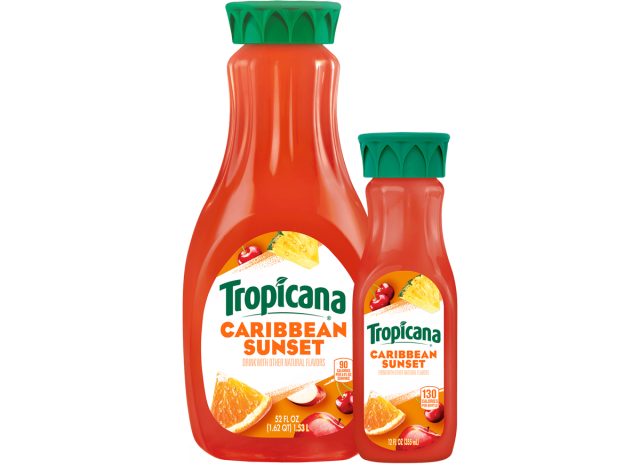
“This juice provides very little nutritional value,” says Krutika Nanavati, MS, a Ph.D. candidate in the School of Sport, Exercise, and Nutrition and licensed nutritionist with ClinicSpots. Tropicana Caribbean Sunset only offers about 10% of your daily value for vitamin C—probably because the main ingredients in this beverage are water and sugar. Out of the whopping 21 grams of sugar in this drink, 17 grams are added sugar.
That also translates to 21 grams of carbohydrates, which is about the equivalent of two slices of wheat bread.
Ocean Spray Pure Unsweetened Concord Grape Juice
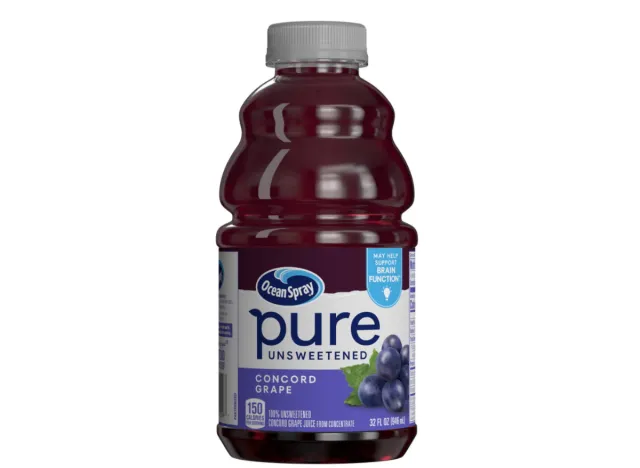
“The Ocean Spray Pure Unsweetened Concord Grape Juice leads you to believe they reformulated their popular grape juice to make it more nutritious for you,” explains Brittany Delaurentis, RD. “However, one cup of juice still provides 37 grams of sugar and 39 grams of carbohydrates. Your best will always be snacking on some fresh grapes instead.”
Simply Fruit Punch
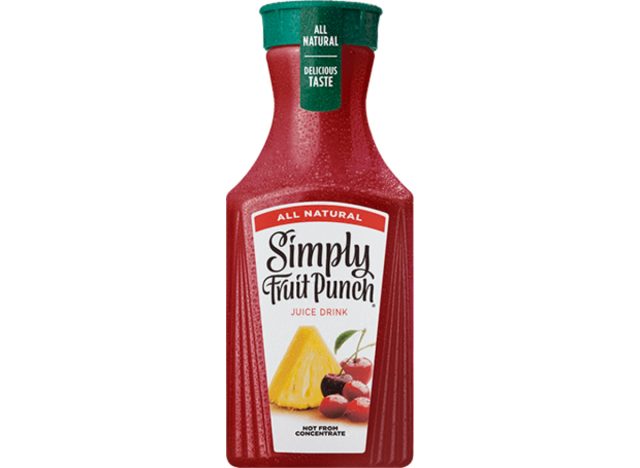
Across the board, dietitians agree that fruit punches should generally be avoided. That’s because they’re usually sugar bombs, and contain very little actual fruit juice.
Take Simply Fruit Punch, for example. The name is a bit misleading, considering that fruit is the third ingredient behind water and sugar. In fact, 21 out of 25 grams of sugar in this drink are purely added sugars.
A previous version of this article was published in May 2023. It has since been updated to include additional research and entires.
- Source: https://www.hsph.harvard.edu/nutritionsource/healthy-drinks/sugary-drinks/
- Source: https://www.heart.org/en/healthy-living/healthy-eating/eat-smart/sugar/how-much-sugar-is-too-much
- Source: https://pubmed.ncbi.nlm.nih.gov/35208888/
- Source: https://pubmed.ncbi.nlm.nih.gov/30535090/
- Source: https://fdc.nal.usda.gov/fdc-app.html#/food-details/172686/nutrients







